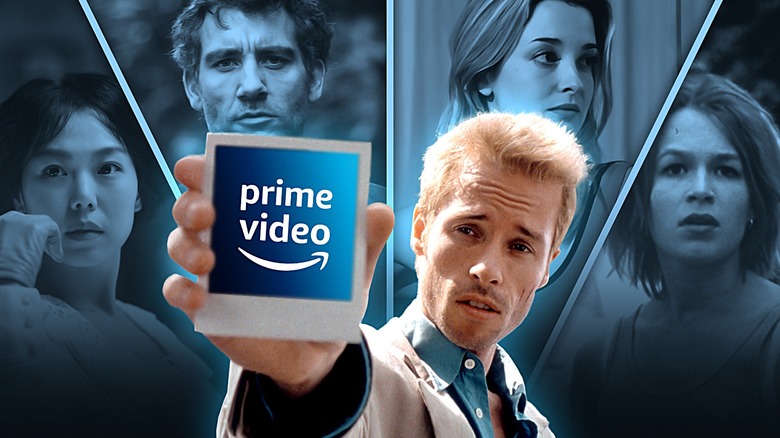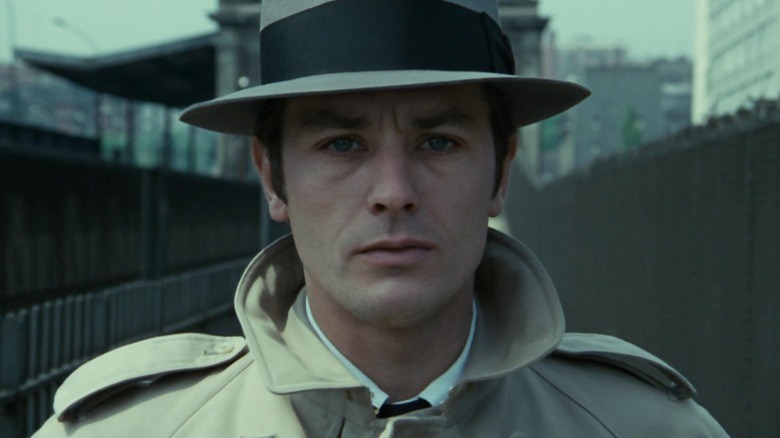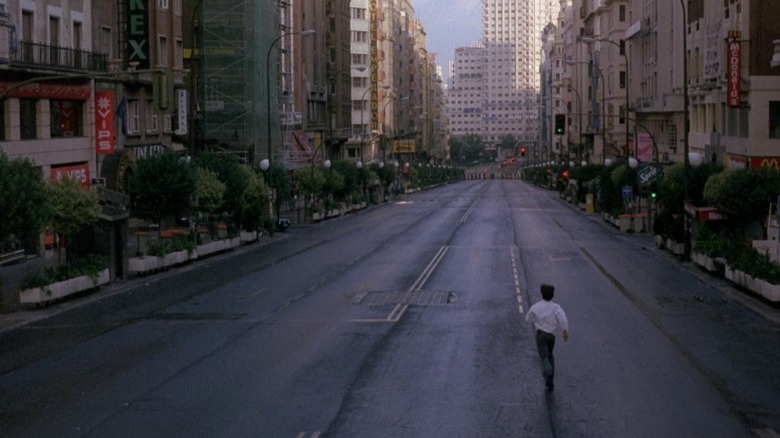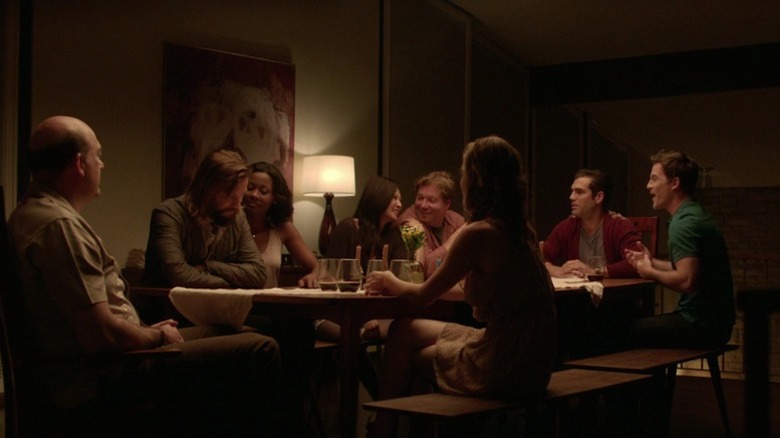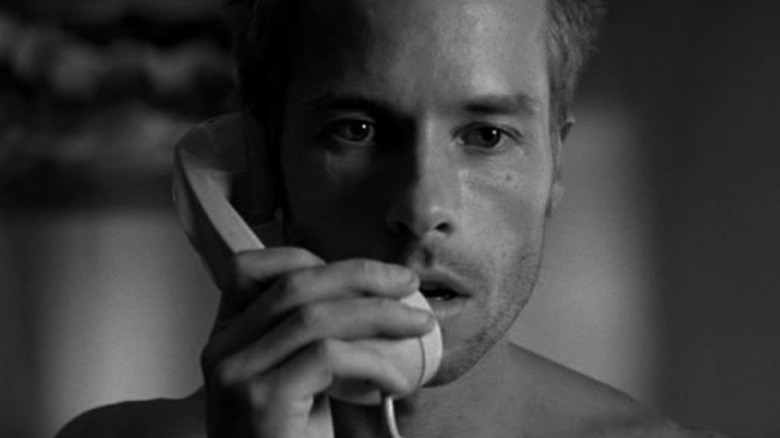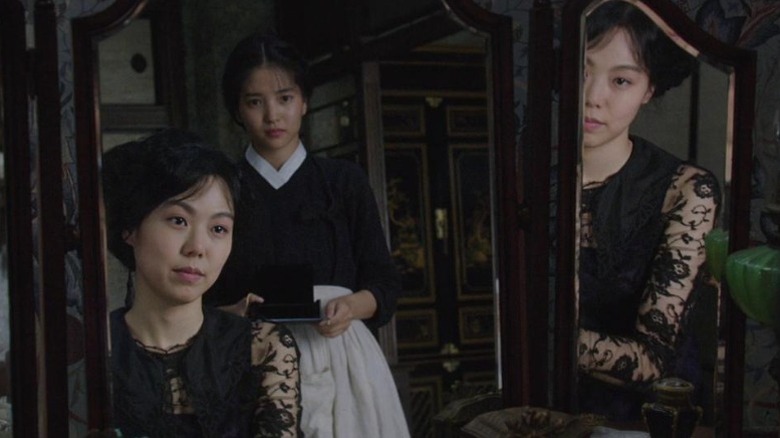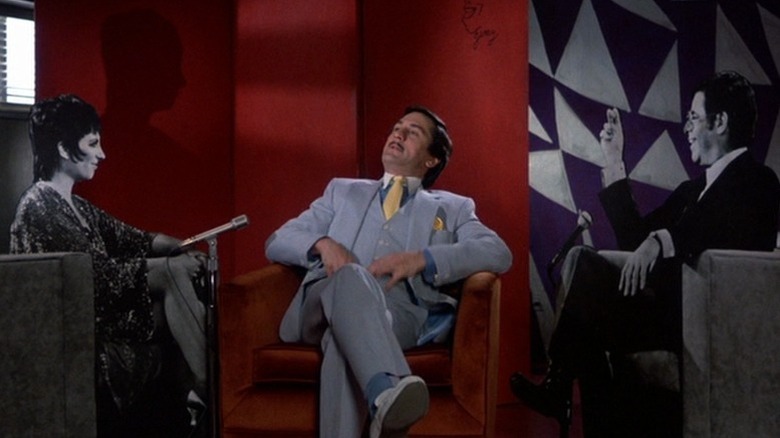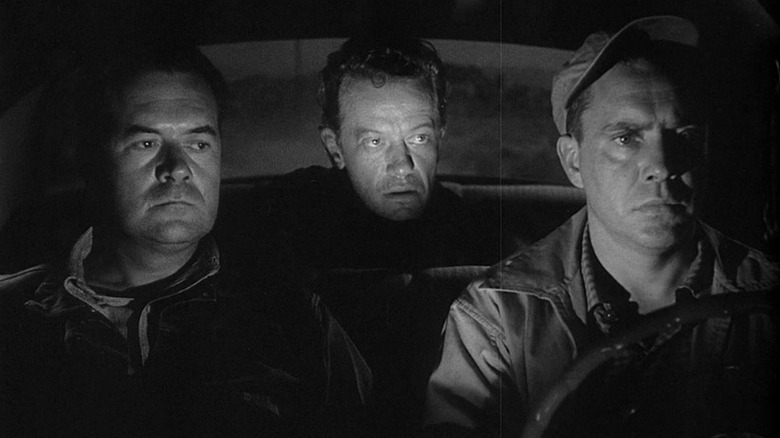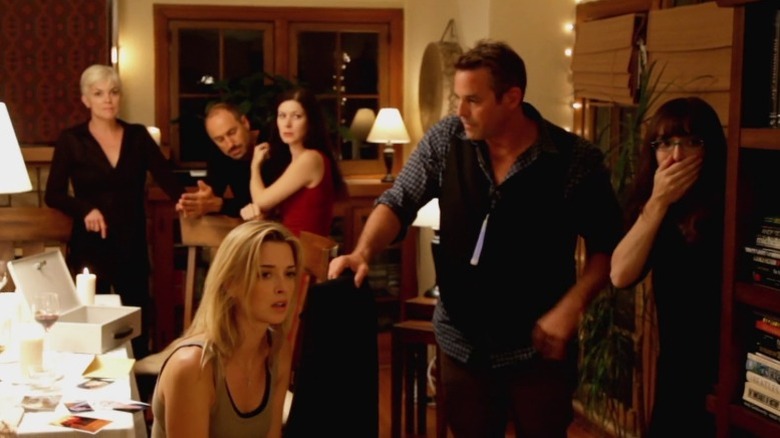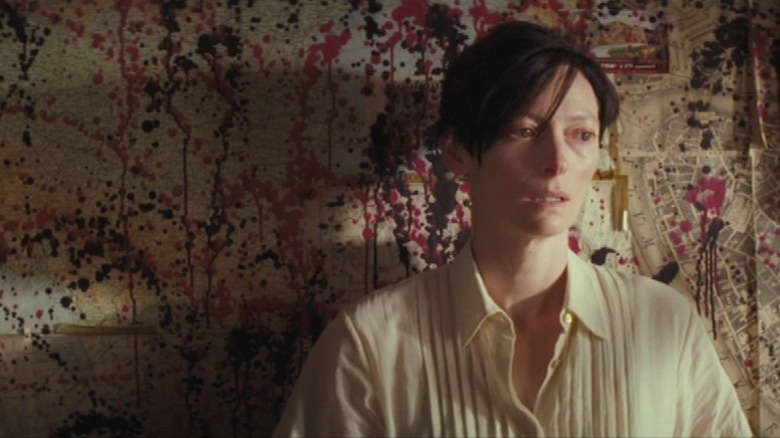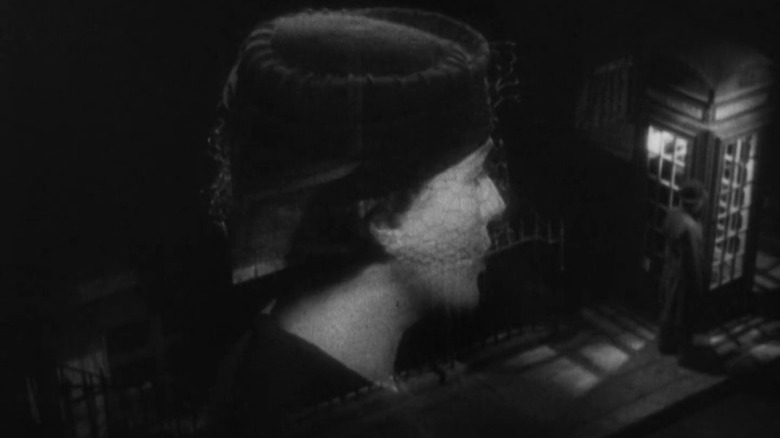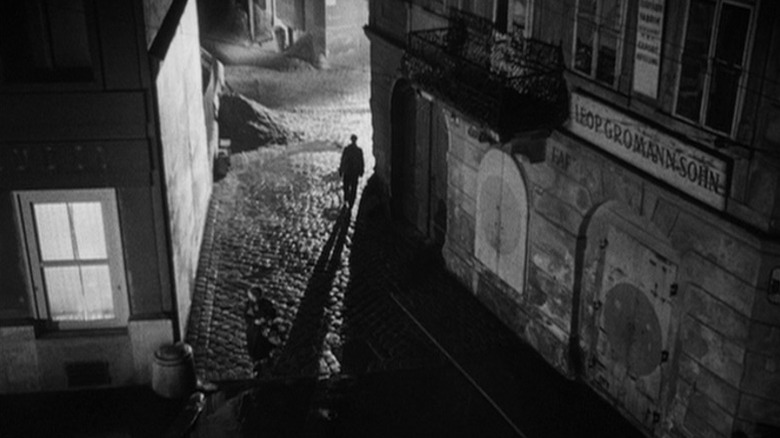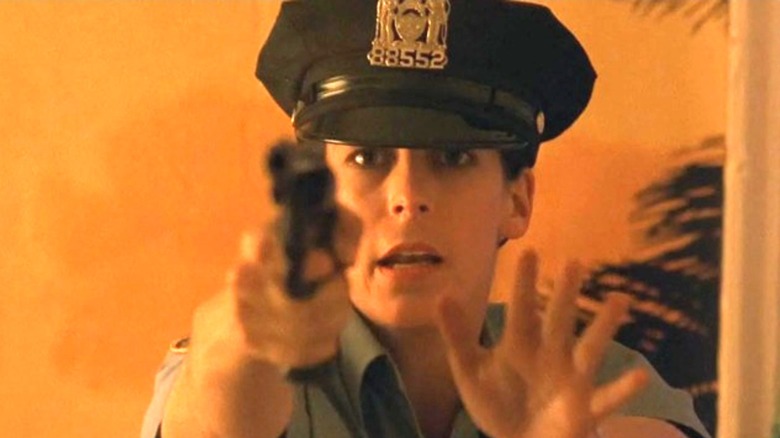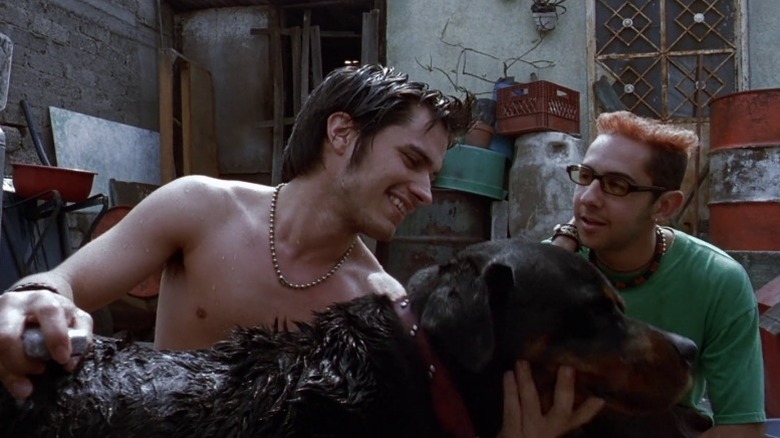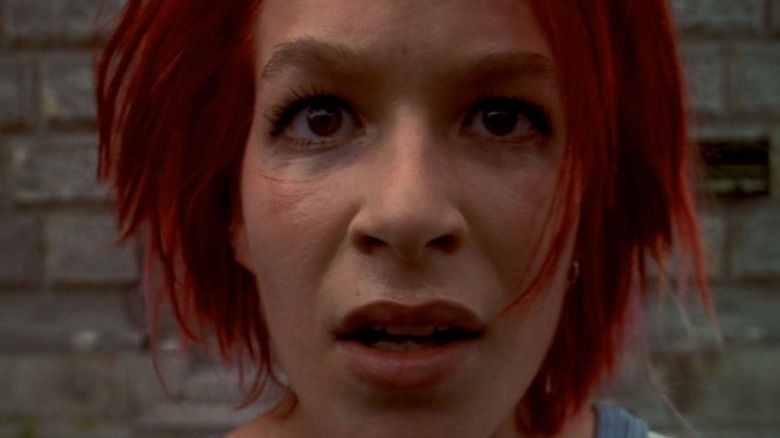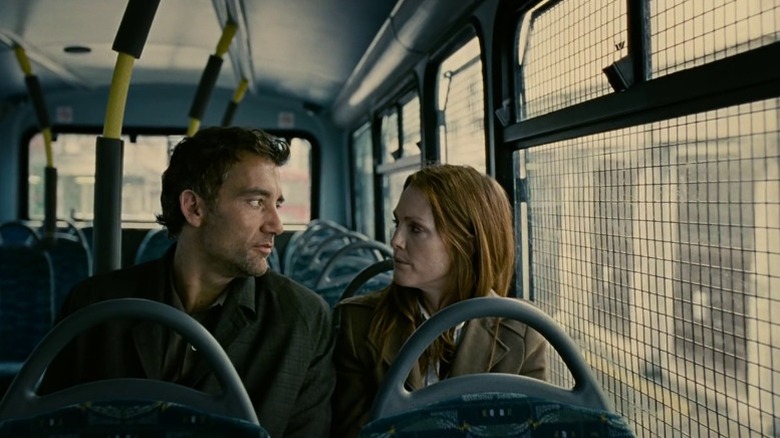The 15 Best Thrillers To Watch On Amazon Prime Video Right Now
Sometimes, the one thing we want out of movies is for them to play on our emotions, senses, and logical reasoning with enough aplomb and effectiveness to make us feel them in our bones — to physically overwhelm us, tense up our nerves, draw sweat from our palms, make our eyes open wide involuntarily.
No kind of movie does that better than a good thriller, whether we're talking tight, single-location potboilers that keep turning up the heat, mind-exploding puzzle films that make you guess and hold your breath for answers, gritty unsentimental crime capers, deep forays into disturbed and traumatized psyches, or carefully-plotted twist-o-ramas. There are countless great thrillers out there, but, if you're looking for a worthwhile one to queue up on Prime Video, you've come to the right place. Here, we've compiled a list of 15 excellent thriller movies available at no additional charge to U.S. Prime Video subscribers.
Le Samouraï
French filmmaker Jean-Pierre Melville was a master of the French neo-noir, channelling the toughness and sobriety of spirit he developed as a Resistance member in World War II into slick, fine-tuned, no-nonsense thrillers about the dark corners and violent underpinnings of urban French society. The arguable peak of his style is "Le Samouraï," a 1967 film starring Alain Delon as a cold-blooded contract killer who suddenly finds himself in the tightest spot of his life.
An arresting character, alternating between an avatar of blistering coolness and a lonely, eccentric shut-in, Delon's trenchcoat-clad Jef Costello is the ideal protagonist for a movie that oozes poise and panache yet boasts plenty of unspoken weirdness around the edges. "Le Samouraï" is the blueprint for every edge-of-your-seat hitman flick that came after, anticipating in both form and attitude the uneasy interplay between stoicism and suppressed desperation that would come to define this particular thriller subgenre, with a richness of craft that feels almost soothing in its breadth — one of film history's great examples of an experienced master channelling his skillset towards lush, entrancing, purely pleasurable pop.
Open Your Eyes
It all begins with a woman's voice, and a whispered, beckoning command: "Abre los ojos." César (Eduardo Noriega) wakes up in his bedroom, where there is no woman; he takes a shower, puts on his clothes, and drives his car through a completely deserted Madrid. Then, it all starts over. Then, we hear him talk to his psychiatrist, apparently contextualizing what we've just seen as a dream. He repeats the same routine, this time proceeding to his normal life. He meets Sofía (Penélope Cruz), and falls in love with her. He gets into a car accident that disfigures his face. And then things start getting weird.
The less said about what subsequently transpires in "Open Your Eyes," the mind-bending 1997 Spanish sci-fi thriller that inspired the underrated Tom Cruise sci-fi movie "Vanilla Sky," the better. Suffice to say, following that disorienting opening, the film keeps one-upping itself with increasing strangeness, surreality, and paranoia, weaving an enthralling, high-stakes tale set nowhere so simple and clear-cut as the real world.
The Invitation
If you're looking for the kind of movie that will gradually make every muscle in your body clench over the course of one excruciating hour, followed by a release so intense that you'll be left scrambling to get your bearings, there's no better viewing option than "The Invitation." This 2015 film finds the perpetually underrated American director Karyn Kusama crafting an unsettling thriller by working in her hardest, leanest, most brutally efficient register yet, putting every trick in her bag in service of gripping minimalist storytelling.
The script, written by habitual Kusama collaborators Phil Hay and Matt Manfredi, follows young couple Will (Logan Marshall-Green) and Kira (Emayatzy Corinealdi) as they begrudgingly accept a dinner party invitation from Will's ex-wife Eden (Tammy Blanchard), who has found love again years after she and Will were shattered by the accidental death of their son. Cloistered in the modernist mansion of Eden and her bizarrely friendly new husband David (Michiel Huisman), Will is forced to confront his repressed grief, and soon learns that the party has dark, shocking secrets in store — a setup Kusama mines for every ounce of bone-chilling intensity, while also subtly delivering a first-rate psychological study of marriage torn apart by tragedy.
Memento
Before Christopher Nolan was scoring billion-dollar box office totals and absolutely dominating the Oscars with his ambitious time- and space-bending blockbusters, he honed his craft with a most simple project — production-wise, anyway. "Memento," Nolan's sophomore film, showcases the superstar director's craft whittled down to bare essentials, exploring both his pet themes and his trademark artistic interests within the framework of a scrumptiously dark and gritty early-2000s puzzle thriller.
The puzzle, such as it is, is making sense of the movie itself. Telling the story of Leonard Shelby (Guy Pearce), a man with short-term memory loss using tattoos and photos to try to find the person who killed his wife and caused his condition, "Memento" unfolds backwards, showing us in retroactive order a series of sequences corresponding to each of the intervals that Leonard is able to remember at a time. As the film moves further back in the chronology, everything we think we know about Leonard and the people around him keeps getting turned on its head, adding up to a violent, paranoid, nerve-racking mystery that overwhelms in its sheer intelligence and emotional density.
The Handmaiden
It would be hard to conceive of a more luxurious, mind-blowing, and wildly entertaining maximalist thriller than Park Chan-wook's "The Handmaiden." Initially presenting itself as a dark, visually dashing period drama about deceit and despair, the movie soon builds a head of tension with its rich and unexpected character work. It then folds everything into a labyrinth of recursive narrative metamorphosis that will leave you alternately biting your nails, gasping in shock, and hooting and hollering at the boldness, beauty, and catharsis of it all.
Set in Japanese-occupied Korea in the 1930s, the film begins with the story of a con artist (Ha Jung-woo) who makes plans to seduce wealthy Japanese heiress Lady Hideko (Kim Min-hee), marry her, and then commit her to an asylum and claim her fortune. To aid him in his plot, he enlists Sook-hee (Kim Tae-ri), a pickpocket, and has her hired by Hideko as a maid. "The Handmaiden" then follows the unique sexual and romantic dynamic that blossoms between Sook-hee and Hideko, as the two women plunge into a web of intrigue and double-crossing so intricate and multi-layered that it's impossible to have a truly firm grip on what's actually going on until the movie's final minutes. Great love story, great mystery, great thriller, great social drama — there aren't many things "The Handmaiden" is not.
The King of Comedy
From his very beginnings as a feature filmmaker, Martin Scorsese has always known how to bang out a taut, distressing thriller; the "right around the corner" scene in "Goodfellas" alone has more tension than some directors' entire filmographies. What's interesting about 1982's "The King of Comedy," though, is that it finds Scorsese pushing himself in a very unusual genre exercise for the time — a thriller that's also a pitch-black comedy that's also an observant character drama.
Robert De Niro gives one of his most deranged performances as megalomaniac aspiring comedian Rupert Pupkin, who becomes convinced that his ticket to success has finally come when he meets popular late night TV host Jerry Langford (Jerry Lewis). After repeatedly trying and failing to get booked on Langford's show, Rupert begins obsessively stalking him. It's a discomfiting, psychically fraught scenario that Scorsese unspools with typical grace, honoring each distinct genre in the mix while making something utterly original and unparalleled of their go-for-broke combination.
The Hitch-Hiker
Classic Hollywood multi-hyphenate actor Ida Lupino was also a legendary filmmaker — one of the forebears of American independent cinema, and maybe its most rigorous, sharp, effervescent practitioner in the 1950s. Lupino's arguable masterpiece, 1953 noir thriller "The Hitch-Hiker," is a cocktail of anger, despair, and nerve-shredding tension that's all the more impressive for being largely set in the same car and centered around the same trio of characters. To boot, it's 71 minutes long — and Lupino doesn't need any more than that to fashion an experience of lingering unease.
The plot is as straight-to-the-point as they come: Two friends (Edmond O'Brien and Frank Lovejoy) from California on a road trip to Mexico pick up a hitchhiker (William Talman) who turns out to be on the run following a series of road robberies and murders. He pulls out a gun, and forces them to assist him in his plan to evade the police. Starting from that perfectly skeletal premise, Lupino and co-screenwriter Collier Young create a whole universe in the pregnant pauses and unspoken hostilities that develop between the three men, sketching out a brilliant study of power and obedience in which masculinity is both helpless against, and synonymous with, the barrel of a gun.
Coherence
Dinner parties gone awry are their own thriller subgenre — indeed, it's a fitting category for at least two movies on this list — but few films have approached that template with more originality than James Ward Byrkit's "Coherence." Although listed as a horror film in some places, "Coherence" is not really horror at all; its temper and demeanor are all thriller, all the time, a gathering storm of suspense and social disarray in which paranoia is gradually ratched up to brain-melting levels with little more than conversation scenes and nifty editing and continuity tricks.
To make things more impressive, the conversations in question are largely improvised: Holding fast to the ethos of depicting naturalist banality disrupted by a massive sci-fi hook, Byrkit had the cast ad-lib most of the scenes while being given only information about their own characters' motivations and thoughts, with each scene and conflict mapping to a precise story diagram only he and co-writer Alex Manugian had access to. As for the sci-fi hook? Eight friends are having dinner together when a comet passes near Earth, and what unfolds after that, you'd best find out for yourself. But rest assured, it will be worth it.
We Need to Talk About Kevin
There is perhaps no other working English-language director more keyed in on film's possibilities for poetic and psychological expression than Lynne Ramsay. Across a monumental filmography somehow made up of only four titles, the Scottish filmmaker has exploded the mental and emotional inner landscapes of several different but always fascinating characters into virtuosic feats of sustained, free-flowing sensory intensity. In some instances, that sensory intensity has also come laced with a fair bit of shocking violence and suffocating tension, resulting in thrillers that draw their power not from brutality in itself, but from the myriad secret scars that said brutality impresses upon the subject.
"We Need to Talk About Kevin" is maybe the most potent example of that particular Ramsayian mode. Charting, in nonlinear time, the reckoning process of a mother (Tilda Swinton) whose teenage son (Ezra Miller) has committed a horrifying school massacre, the film hews to the vantage point of protagonist Eva Khatchadourian with an almost medical degree of intimacy. At the same time, it spins a complex, epic narrative of parent-child resentment around Eva that even she herself isn't quite able to grasp. The secret to that impossible balancing act is Ramsay's singular, cinema-breaking technique, which makes the material a maddening maze.
The 39 Steps
There are several Alfred Hitchcock classics available to watch on Prime Video, and any one of them is guaranteed to scratch your thriller itch. Of all the iconic masters, Hitchcock was the one who endeavored to be first and foremost a great ringmaster, bending audiences' fears and anxieties to his will, creating irresistible suspense-building and anxiety-inducing film techniques that are still routinely imitated to this day. But, for this list, to shout out a period of Hitchcock's output that's unduly neglected even by his fans — the 1930s — let's go with "The 39 Steps."
The title of the 1935 film refers to a mysterious, elusive spy ring that's supposedly out to steal classified British military information, and which becomes a fixation of one Richard Hannay (Robert Donat) when he's wrongfully suspected of murdering a female spy (Lucie Mannheim). The best-crafted, most purely entertaining of all Hitchcock's "wrong man" films, "The 39 Steps" is not just a high-octane thrill ride in its own right, but a fascinating tome for movie buffs curious to see firsthand one of the building blocks of contemporary action blockbusters.
The Third Man
Widely held up as one of the greatest movies of all time, Carol Reed's dazzling 1949 classic "The Third Man" is the peak of film noir as a movement, as a style, and as a conceptual proposition — as well as one of the most gripping thrillers you can watch not just on Prime Video but anywhere at all.
A gnarly Joseph Cotten stars as Holly Martins, a cash-strapped Western pulp novel writer who is offered a job by his childhood friend Harry Lime (Orson Welles) and travels to Allied-occupied Vienna to take him up on it — only to be informed that Lime has died in a car accident. It doesn't take long for Martins to start investigating the shady circumstances of Lime's death, and of Lime's life more broadly. What emerges is a distillation of noir to its purest, headiest essence, laden with German Expressionist shadows and tilted angles, pulse-pounding to the very last seconds, and featuring Welles in maybe the most towering supporting performance ever committed to film — complete with some genius improv.
Blue Steel
This 1990 cop thriller, arguably the most underrated entry in Kathryn Bigelow's filmography, is as disinterested in sticking to the orthodoxy of its own genre as any Bigelow film. For starters, where most cop movies follow the investigation or the chase, "Blue Steel" is a tale of excruciating certainty, in which NYPD officer Megan Turner (Jamie Lee Curtis) knows that the unhinged Eugene Hunt (Ron Silver) is the man who stole her gun and is using it to commit random serial murders — but has no material way of proving it.
Secondly, where a lesser film would cut itself some slack by eschewing meaningful exploration of the complex power dynamics inherent to police work, and especially to police work as a woman in 1990, "Blue Steel" makes those dynamics its chief concern — mining tension not so much from the nuts and bolts of Turner's police work as from the cat-and-mouse game that Hunt begins to play with her. It's the rare police film that sidesteps shorthand or convention, taking the time to grapple seriously with its own subject matter.
Amores Perros
Before pivoting to intimate character studies with lush fisheye-lens photography, Alejandro González Iñárritu used to specialize in that most aughts-core of cinematic artifacts: the hyperlink movie. And there's an argument to be made that he had already perfected the form as early as 2000, when "Amores Perros," his Spanish-language Mexican debut, took the world by storm with its three intersecting tales of crime, tragedy, and urban turmoil.
All three stories take place in the bustle of Mexico City, where a car crash brings together the fates of three characters: Octavio (Gael García Bernal), a young man who has turned to stacking dogfighting money to run away with his sister-in-law Susana (Vanessa Bauche); Valeria (Goya Toledo), a supermodel who faces a career crisis after injuring her leg; and El Chivo (Emilio Echevarría), a mysterious homeless man to whom there's more than meets the eye. Amid the violence and grand melodrama of his triptych narrative, Iñárritu locates the quintessence of the hyperlink movie as a perfect vehicle for thriller excitement, one story building upon the tension and intensity of the other in an unrelenting fever pitch.
Run Lola Run
It doesn't get more heart-pounding than "Run Lola Run." The core idea behind Tom Tykwer's cult classic 1998 film is a simple one: A single, unfathomably urgent and desperate life-or-death situation is explored three times in three possible scenarios. The mission of protagonist Lola (Franka Potente), presented without frills right at the start of the movie, is also simple, albeit near-impossible: She must somehow obtain 100,000 Deutsche Marks in 20 minutes to save the life of her clumsy bagman boyfriend Manni (Moritz Bleibtreu).
The execution, however, couldn't be more complex. The film branches out into different possible realities the moment Lola either passes by, trips, or leaps over a man with a dog on the street. Not only does Tykwer lace each version of his anxious mini-story with small details that augment and inform and play on the other two timelines, but the individual telling of each timeline is carried out with one of the most stunning levels of energy and kineticism in film history. The whole movie feels, in the best way, like a hazy sugar rush — thrice over.
Children of Men
Alfonso Cuarón's 2006 dystopian sci-fi masterpiece gets talked up a lot for its stunning inventions of brand-new camera tech, its enormous dramaturgical force, and its chilling political prescience. But not enough people give "Children of Men" due credit as one of the best, most efficient, most compulsively watchable thrillers of the 21st century.
It's all down to Cuarón's synchronous command of both space and narrative, which allows him to plot out emotionally harrowing sequences over carefully-defined physical parameters. In each scene of "Children of Men," he ensures that the film's story of an Earth torn apart by an infertility epidemic is not only thoroughly intelligible and arresting, but intuitively felt in its every material development. It's no wonder that his follow-up film — 2013's "Gravity" — took to space for a bare-bones survival adventure story; by the time the credits of "Children of Men" roll, you get the sense that Cuarón has nothing left to prove in Earth-bound storytelling.
